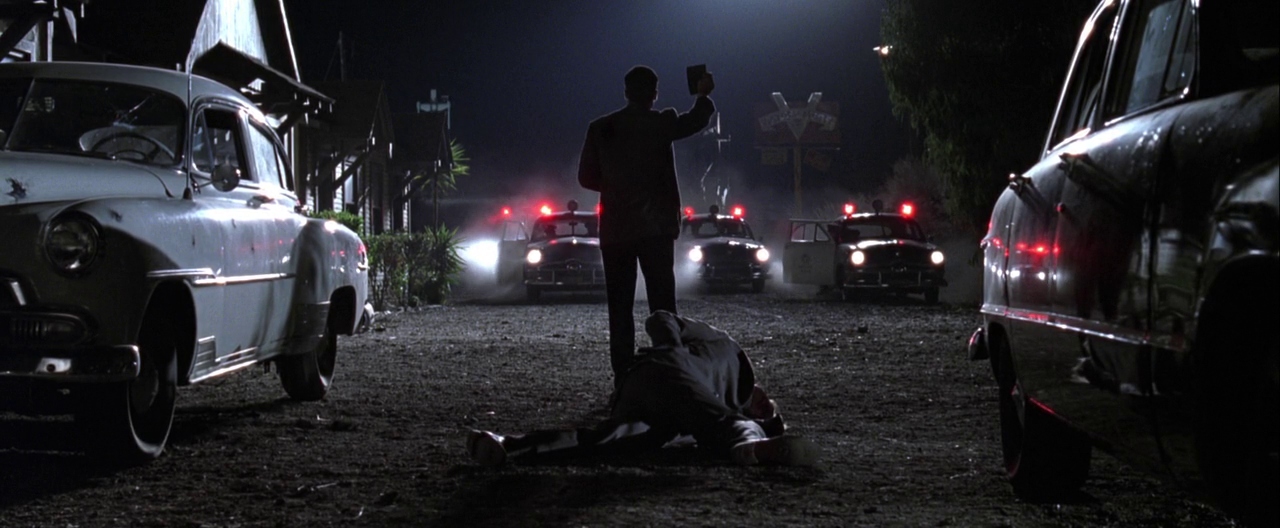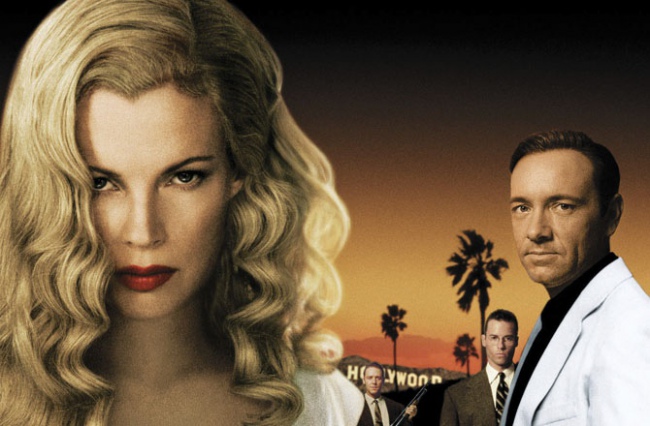L.A. Confidential (1997).
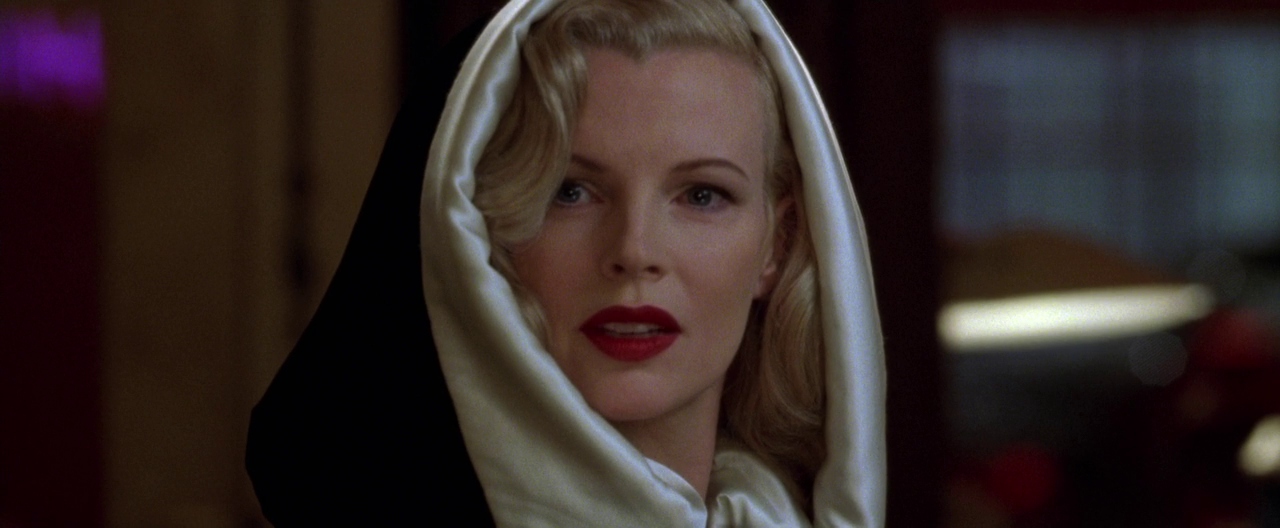 *** SPOILER WARNING ***
*** SPOILER WARNING ***
The 1990’s was a decade littered with a glut of truly great crime films such as Heat, Se7en, The Usual Suspects and Pulp Fiction to name but a few, all are films which have extensive texts dedicated to them and are still spoken about today with a passionate reverence.
In 1997 Warner Bros. released Curtis Hanson’s adaption (co-written along with Brian Helgeland) of James Elroy’s epic tome, L.A. Confidential (the third of his ‘L.A. Quartet’ series). A multi-character, crime-noir set in the 1950s starring two then relatively unknown Antipodean actors and an actor very much on a streak of hit films and accolades aplenty, at the time it didn’t seem like a bona fide box office hit nor a serious awards contender.
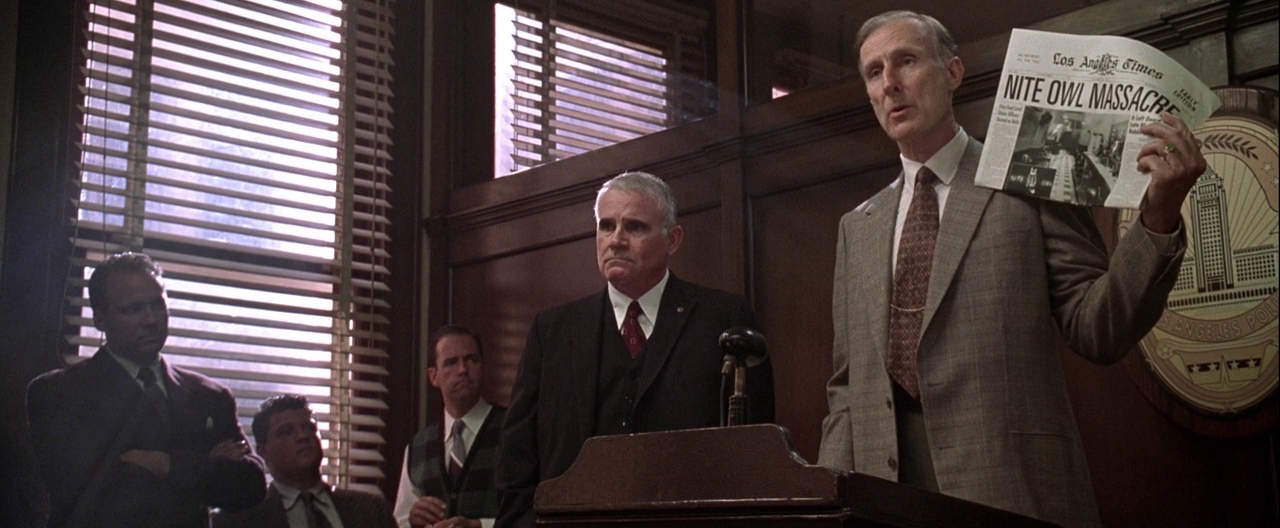
What Hanson delivered was a taught, densely layered crime-thriller that let the story fold out and left the audience guessing what was coming next, who would survive and how it would end. It was not the whole book, though. The book had numerous main characters and more than three distinct story threads which Elroy slowly weaved together. For cinematic reasons these stories were trimmed down and some characters were either removed completely or altered slightly for the film. Elroy himself was said to be very pleased with the final result.
The casting of Russell Crowe and Guy Pearce would turn out to be a master-stroke for the film. It could be argued that this is Crowe’s best performance to date. Yes, he won awards aplenty for his magnetic portrayal of Maximus in Gladiator, but his performance here as the hard-as-nails but ultimately honourable Officer Bud White, reveals Crowe to be a man of nuance, as White, far from being a natural detective, figures out what’s happening around him, all the while being one step behind those who are unfurling the film’s sinister central plot thread. His turn from utter contempt to rage to one of genuine concern and compassion is quite remarkable.
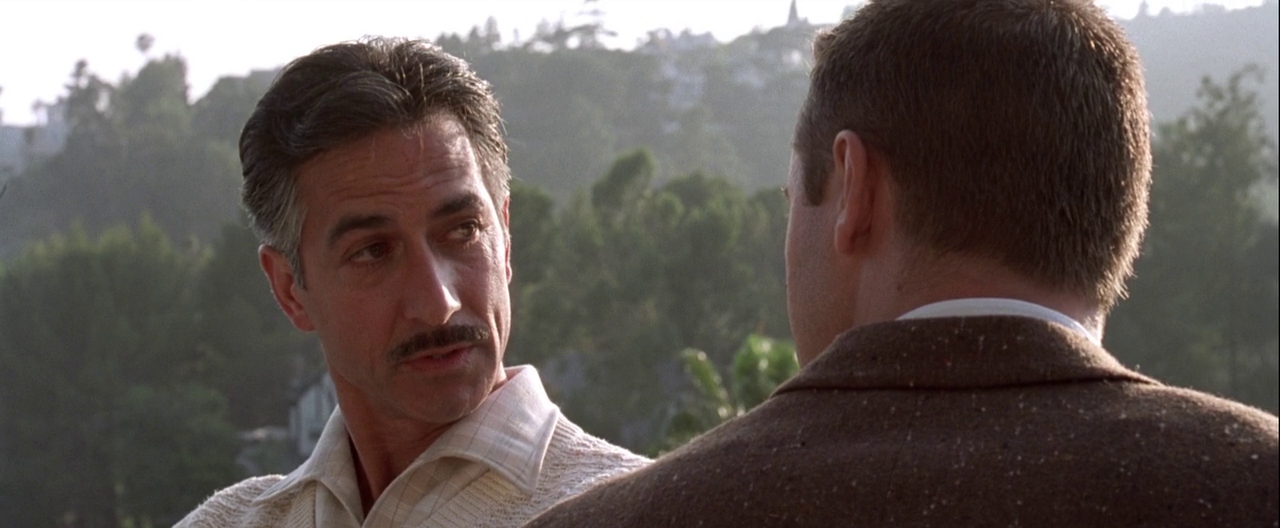
Guy Pearce was known predominantly in the United Kingdom for his role on the still-running Australian TV show Neighbours (in which Crowe also very briefly appeared). He’s terrific as Ed Exley, the career cop out of step with his seasoned peers and a man determined to get what he wants, regardless of who he upsets or steps on along the way. His journey from stiff, by-the-books Lieutenant to a man who will take dangerous risks for the pursuit of justice whilst still keeping his politician’s thought process and keen instincts as one is again remarkable.
Kevin Spacey was on a roll in the 1990s as one the era’s most prominent character-actors, beginning almost with Glengarry Glenn Ross to his first Oscar win in 1995 for The Usual Suspects through to his second Oscar in 1999 for American Beauty (via Se7en, Outbreak, A Time To Kill and The Negotiator to name but a few). Spacey’s Sergeant Jack Vincennes is more movie star than Policeman, swaggering through TV shows and staged drug busts for the media until his moral compass shifts following the failed set-up of a prominent city official and an aspiring young actor goes fatally wrong which ties into Exley and White’s investigations. As previously stated, the now disgraced Spacey was on a roll with a string of excellent performances and among a cast universally at the top of their game, he admirably joins them here in another bravura performance.
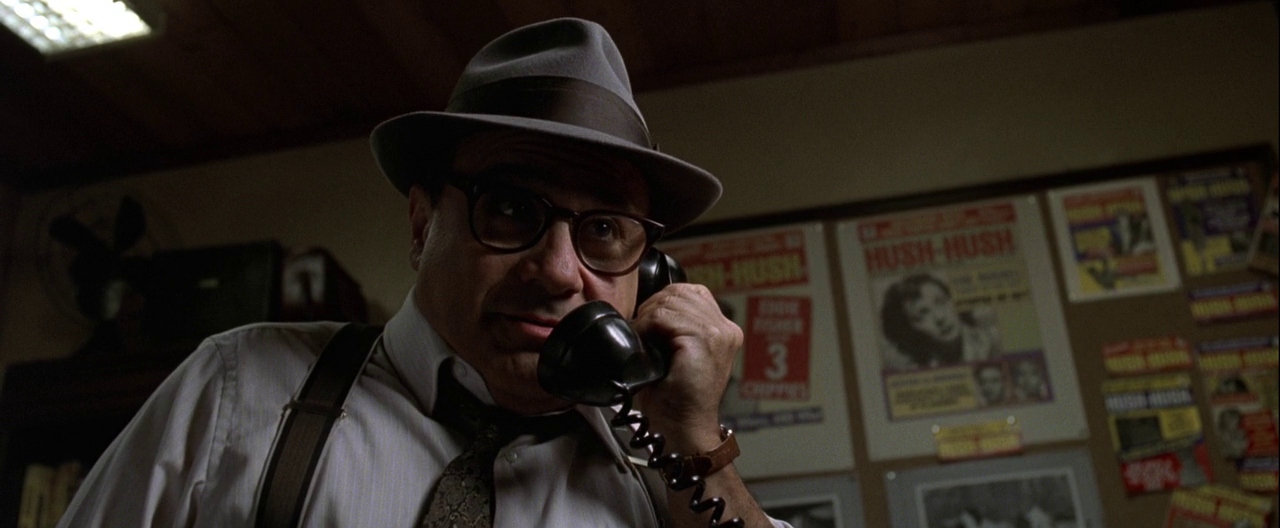
I’ve always wondered why James Cromwell wasn’t given an above-the-title credit or used in the promotional pieces for the film, considering that his role of Captain Dudley Smith is one of the most important characters in L.A Confidential. Perhaps it was omitted to keep the identity of the ‘bad guy’ a secret until his shocking reveal (and a real shock it is) to keep the audiences guessing. Indeed, until Jack Vincennes visits him off duty for advice, the suggestion that he is involved in any sort of criminality is never implied nor suggested. Or perhaps they didn’t want Farmer Hoggett to be misinterpreted as a cruel, corrupt, devious villain instead of someone you’d want as your Grandfather. Playing on Cromwell’s established wholesome persona from prior films was a brilliant move and reminiscent of Ronny Cox’s foray into villainy in the two films he made with Paul Verhoeven.
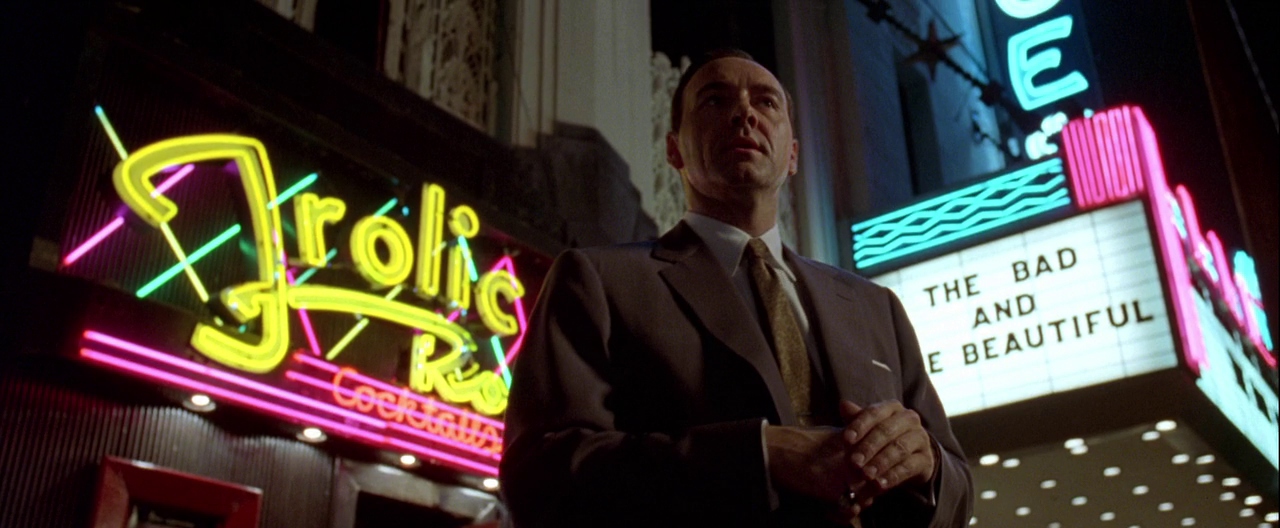
Kim Basinger won an Oscar for her portrayal as Lynn Bracken, the hopeful actress who fell into prostitution as a Veronica Lake lookalike. She certainly shines, dressed almost always in silks to add to her illuminating presence. The only time she doesn’t look glamorous is post-assault at the hands of Bud White. L.A. Confidential was something of a short-lived return to fame for Basinger, it’s unfortunate that her career failed to sustain this second wind after her performance here.
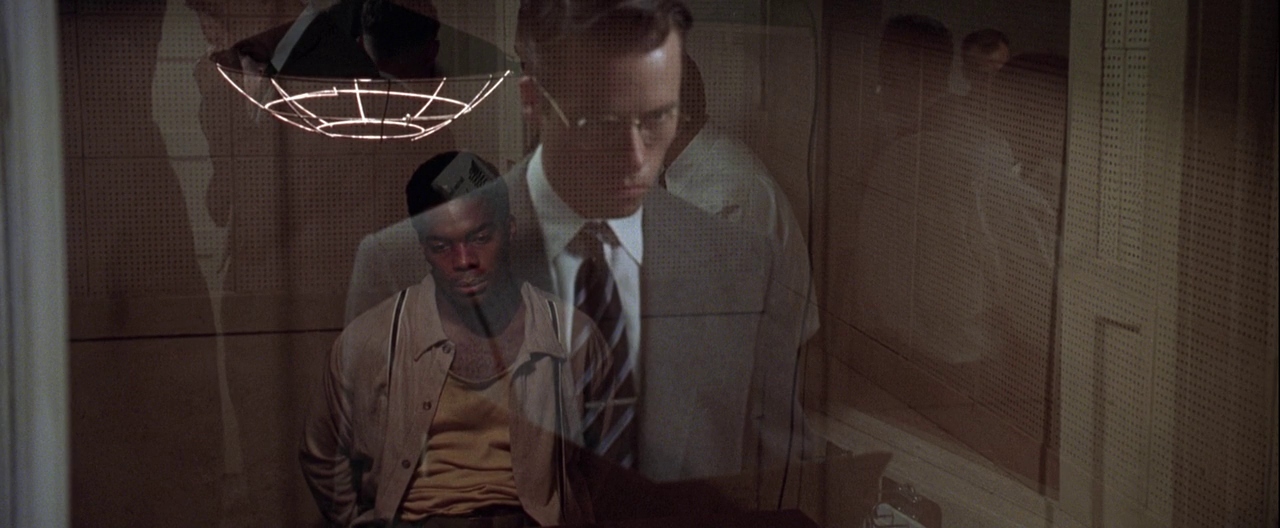
Danny DeVito brings oozes of slime to the role of Editior-In-Chief/Papparazzi Ghoul, Sid Hudgens, who becomes an unwitting cog in the wheel of corruption and ultimately a victim at the hands of the vicious Dudley Smith. DeVito’s narration gives the film a feeling akin to classic film noir and killing off the narrator, traditionally a character one expects to make it to the end of any film, is another refreshingly bold sidestepping of convention.
Mention must go to David Strathairn as the well-to-do but somewhat shady, or as Sid Hudgens himself calls him ‘Twilight’, Piers Patchett, a clearly connected and influential man who can give you ‘Whatever You Desire’. He avoids using any of the tells or giveaways that would assist a first time viewer in working out his ultimate role or motive within the story. Even the actors who have relatively little screen time, such as Strathairn, are never less than on form throughout.

Hanson’s labyrinthine style of storytelling never twists itself in knots, unravelling the plot at a leisurely pace but ramping up the complexity of scenarios whilst maintaining tension when needed. Hanson utilises some brilliant stylistic choices throughout, one such being the use of nothing more than the noise of a TV show to form the soundtrack of the rescue of a rape victim in one tense sequence. The action, violent because it has to be, is staged at close quarters and is all the more graphic for it. It’s there as a propulsion rather than a repulsion, showing that violent acts have dire consequences.
Even though L.A. Confidential is now well over two decades old, I’ve purposely avoided giving major plot points away because the film is just as rewarding on repeat viewings and because I want you, the reader, to go back and appreciate it again, to be reminded of what is, a masterful tale of the exuberance of Hollywood resting on a fragile foundation of criminality.
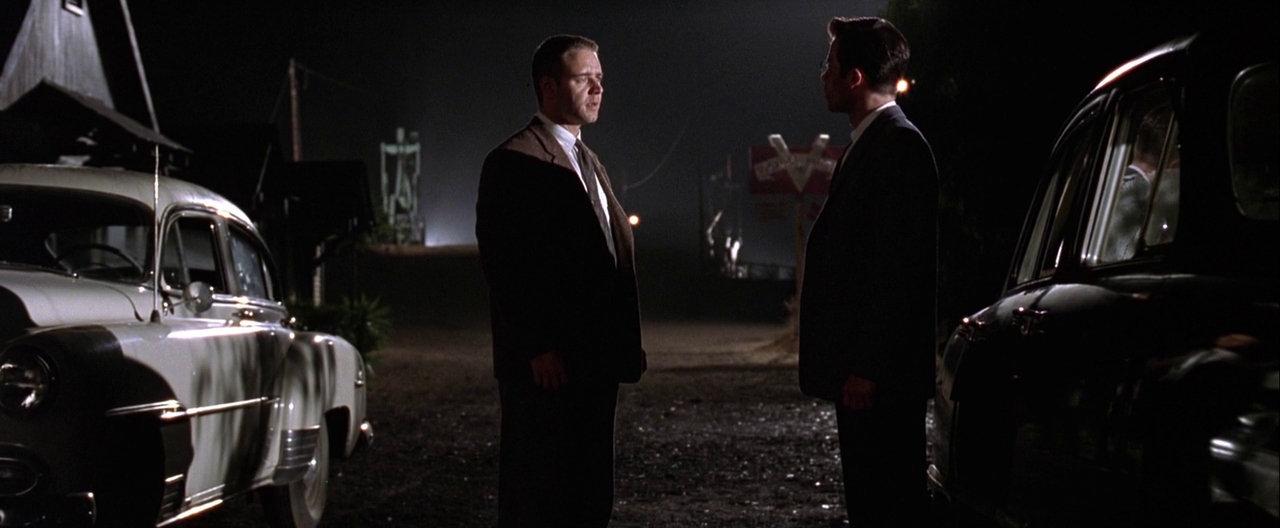
It harkens back not only to the beloved film noir style of the 1930s, ‘40s and ‘50s but also bears a similar style and feel to the likes of Roman Polanski’s Chinatown. Whereas films like Pulp Fiction spawned a slew of lesser imitators, strangely though, L.A. Confidential did not. Maybe that’s testament to how perfectly crafted and, certainly amongst its peers of the time, unique Hanson’s film was. In a decade full of some frankly phenomenal crime thrillers, L.A Confidential stands out not only as one of the best examples of the genre, but one of the best films of the 1990s.
Film ‘89 Verdict – 10/10
And as a footnote, it’s worth noting that when it came to the subsequent awards season following L.A Confidential’s release, Titanic won more Oscars by quite a margin, which many would argue really was criminal.
